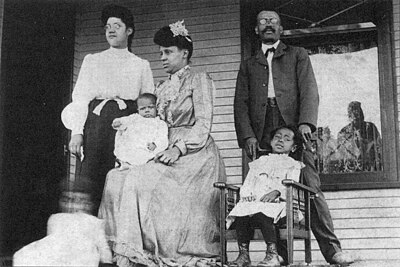Susie Revels Cayton
Susie Revels Cayton | |
|---|---|
 | |
| Born | Susan Sumner Revels 1870 Mississippi, United States |
| Died | 1943 (aged 72–73) |
| Alma mater | Rust College |
| Occupation | Writer, activist |
| Spouse(s) | Horace Cayton Sr. |
| Children | Horace Cayton Jr., Revels Cayton |
| Parent(s) |
|
Susie Revels Cayton (1870 – 1943[1]) was a writer, editor, activist, and leader in the Black community in Seattle at the start of the 20th century.[2]
Biography[]
Early life[]
Susie Sumner Revels was born in Mississippi in 1870, the same year her father, Hiram Revels, became the first Black senator in US history.[1] Revels' middle name "Sumner" was a tribute Charles Sumner, Hiram Revels friend, who was sworn in as the Massachusetts senator the year Susie was born.[3] Hiram Revels escorted Sumner at his swearing-in ceremony.
Revels graduated with honors from Rust College, teaching for three years, before returning to school to pursue a degree in nursing.[4][5]
Career as a writer, journalist, and editor[]
Revels met her future husband, Horace Cayton, in Mississippi and after a period of long distance letter writing[4] followed him to Seattle in 1896, where they were married in July of the same year. She had started writing for his Seattle-based newspaper, The Seattle Republican, before leaving Mississippi. She eventually became associate editor in 1900 and continued working at the paper until it folded in 1913.[4][1][6]
Revels and her husband started the newspaper Cayton's Weekly in 1916, which targeted the Black community in Seattle. The paper ran until 1920 when it was replaced by Cayton's Monthly which only ran for two issues.[6]
In addition to her journalistic writing, Revels wrote short stories which appeared in The Seattle Republican, Cayton's Weekly, and the Seattle Post-Intelligencer.[7]

Later life[]
In 1919, at the age of 49, Susie Revels Cayton was forced to seek employment as a "domestic" as the family experienced economic hardships.[8]
In her sixties, she became politically active and joined the Communist Party, after being introduced to the organization by her son, Revels Cayton, and was considered "one of the state's most prominent African American radicals".[4] She joined the communist party in reaction to depression-era Seattle, believing that only radical political change could address economic inequality.[8]
She became friends with activists Paul Robeson and Langston Hughes, and was admired by Richard Wright.[8] Langston Hughes dedicated a poem, Dear Mr. President, to her.[5]
Revels Cayton moved to Chicago in 1942, two years after her husband died, to be closer to her children. She continued advocating for progressive politics and communism to promote equality until she died in 1943.[8]
Charitable work[]
- The Dorcas Club of Seattle, founding member and leader[6]
- Skid Row Unemployed Council, Secretary[8]
- Negro Workers Council, Vice President[8]
Children[]
Susie Revels Cayton had five children with Horace Cayton Sr. They had two sons, activists Horace Cayton, Jr. and Revels Cayton. Their oldest daughter, Ruth.[11] Second daughter, Madge, who was one of the first African American women to graduate from the University of Washington and a social worker. And a third daughter, Lillie. They also adopted their granddaughter, Susan, after Ruth passed away in 1919, and raised her as their youngest child.[11][5] [12]
Legacy[]

In 1992 the Cayton Scholarship was established to honor both Susie and Horace Cayton. This scholarship is available to minority students in Washington state pursuing a public relations career.[13]
In 1902 Revels Cayton and her husband had a house built in Seattle's prosperous Capitol Hill neighborhood. In 2021 Seattle's Landmarks Preservation Board designated the house as a historic landmark. [14] [15][16]
Published works[]
External links[]
- Seattle Republican: Northwest Negro Progress Number published by H.R. Cayton and Susie Revels Cayton
- Susan Cayton Woodson Papers
References[]
- ^ a b c "Susie Sumner Revels Cayton Biography". www.notablebiographies.com. Retrieved 2019-01-13.
- ^ "Cayton, Susie Revels (1870–1943) | The Black Past: Remembered and Reclaimed". blackpast.org. Retrieved 2019-01-13.
- ^ Mumford, Esther (1980). Seattle's Black Victorians 1852-1901. Ananse Press. pp. 86–95.
- ^ a b c d "Who's Who in Communist Party". depts.washington.edu. Retrieved 2019-02-28.
- ^ a b c McClain, Tiffany (October 24, 2002). "Heritage House". Chicago Reader.
- ^ a b c d e Tricia Martineau Wagner (2007). African American women of the Old West (1st ed.). Guilford, Conn.: TwoDot, an imprint of The Globe Pequot Press. ISBN 9780762739004. OCLC 70230638.
- ^ "Susie Revels Cayton (1870-1943) • BlackPast". BlackPast. 2007-01-22. Retrieved 2019-02-28.
- ^ a b c d e f Taylor, Quintard (1994). The forging of a black community : Seattle's Central District, from 1870 through the Civil Rights Era. University of Washington Press. ISBN 0295973153. OCLC 844198583.
- ^ "Asberry, Nettie Craig (1865-1968)". www.historylink.org. Retrieved 2021-04-30.
- ^ S, 4800; WA 98105 206-987-2000 866-987-2000206-987-0391, Point Way NE Seattle (2021-03-01). "Before EMTALA, There Were Black Women With Hidden Histories". On the Pulse. Retrieved 2021-04-30.CS1 maint: numeric names: authors list (link)
- ^ a b "Knute Berger | Crosscut". crosscut.com. Retrieved 2021-02-16.
- ^ Schechter, Patricia. "The Cayton Legacy: An African American Family by Richard S. Hobbs (Review)". Oregon Historical Quarterly. 104 (2): 279–281 – via JSTOR.
- ^ "PRSA Puget Sound Chapter - Scholarships". prsapugetsound.org. Retrieved 2021-05-01.
- ^ "The Cayton-Revels House - A Newsworthy Landmark". Historic Seattle. 2021-03-31. Retrieved 2021-04-30.
- ^ Ebrahimi, Taha S. (2021). Landmark Nomination Application: The Cayton Revels House (PDF). Seattle, Washington.
- ^ Campanario, Gabriel (March 21, 2021). "The Cayton-Revels House on Capitol Hill stands on a solid foundation of commitment to preservation". The Seattle Times.
- ^ "Susie Revels Cayton: "The Part She Played" – Seattle Civil Rights and Labor History Project". depts.washington.edu.
- African-American women writers
- 1943 deaths
- 1870 births
- Writers from Seattle
- Rust College alumni
- African-American history of Washington (state)
- Writers from Mississippi
- Activists for African-American civil rights
- African-American communists
- African-American history in Seattle